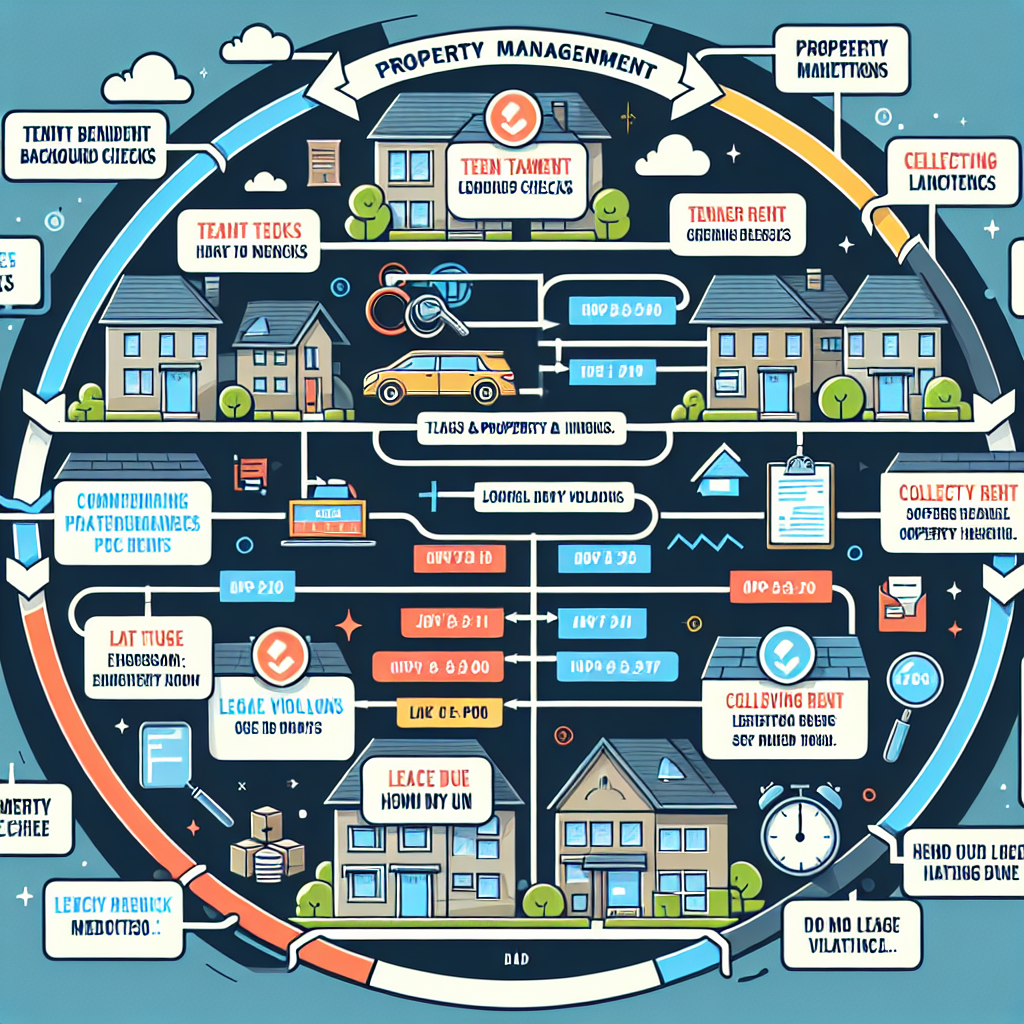-
Table of Contents
- Comprehensive Property Management Timeline: Tasks and Deadlines
- 1. Pre-Lease Period
- 1.1 Property Preparation
- 1.2 Marketing the Property
- 1.3 Tenant Screening
- 2. Lease Signing and Move-In
- 2.1 Lease Agreement
- 2.2 Move-In Inspection
- 2.3 Tenant Orientation
- 3. Ongoing Property Management
- 3.1 Maintenance and Repairs
- 3.2 Rent Collection and Financial Management
- 3.3 Tenant Relations
- 4. Lease Renewal and Move-Out
- 4.1 Lease Renewal
- 4.2 Move-Out Process
- 5. Legal Compliance and Risk Management
- 5.1 Legal Compliance
- 5.2 Risk Management
- Conclusion
Comprehensive Property Management Timeline: Tasks and Deadlines

Property management is a multifaceted endeavor that requires meticulous planning, organization, and execution. A well-structured timeline is essential for ensuring that all tasks are completed efficiently and on time. This article provides a comprehensive property management timeline, detailing the tasks and deadlines that property managers should adhere to for optimal performance. We will explore various aspects of property management, including tenant relations, maintenance, financial management, and legal compliance, supported by relevant examples, case studies, and statistics.
1. Pre-Lease Period
The pre-lease period is crucial for setting the stage for successful property management. During this phase, property managers must focus on preparing the property, marketing it effectively, and screening potential tenants.
1.1 Property Preparation
Before marketing the property, it is essential to ensure that it is in excellent condition. This includes:
- Conducting a thorough inspection to identify any necessary repairs or upgrades.
- Cleaning the property to make it presentable for potential tenants.
- Staging the property to highlight its best features.
Example: A case study by the National Association of Realtors found that staged homes sell 73% faster than non-staged homes, emphasizing the importance of property preparation.
1.2 Marketing the Property
Effective marketing is key to attracting high-quality tenants. Property managers should:
- Create compelling listings with high-quality photos and detailed descriptions.
- Utilize multiple platforms, including online rental websites, social media, and local classifieds.
- Host open houses and virtual tours to showcase the property.
Statistics: According to Zillow, 83% of renters use online resources to search for rental properties, highlighting the importance of a strong online presence.
1.3 Tenant Screening
Screening potential tenants is critical to ensuring a smooth tenancy. Property managers should:
- Conduct background checks, including credit, criminal, and eviction history.
- Verify employment and income to ensure tenants can afford the rent.
- Check references from previous landlords.
Example: A study by TransUnion found that tenants with a credit score of 650 or higher are 50% less likely to default on rent payments.
2. Lease Signing and Move-In
Once a suitable tenant is found, the next phase involves finalizing the lease agreement and facilitating a smooth move-in process.
2.1 Lease Agreement
The lease agreement is a legally binding document that outlines the terms and conditions of the tenancy. Property managers should:
- Ensure the lease complies with local and state laws.
- Clearly outline rent, security deposit, and maintenance responsibilities.
- Include clauses for late payments, property damage, and lease termination.
Example: A case study by the American Apartment Owners Association found that clear and comprehensive lease agreements reduce disputes and legal issues by 30%.
2.2 Move-In Inspection
A move-in inspection helps document the property’s condition before the tenant takes possession. Property managers should:
- Conduct a detailed walkthrough with the tenant.
- Document any existing damage or issues with photos and written notes.
- Have the tenant sign an inspection report to acknowledge the property’s condition.
Statistics: According to a survey by Rent.com, 48% of tenants reported disputes over security deposits, often due to unclear move-in inspections.
2.3 Tenant Orientation
Providing tenants with essential information about the property and their responsibilities can prevent misunderstandings. Property managers should:
- Provide a welcome packet with contact information, emergency procedures, and property rules.
- Explain how to submit maintenance requests and pay rent.
- Answer any questions the tenant may have about the property or lease terms.
Example: A case study by the Institute of Real Estate Management found that tenant orientation programs reduce turnover rates by 20%.
3. Ongoing Property Management
Once the tenant has moved in, property managers must focus on maintaining the property, addressing tenant needs, and managing finances.
3.1 Maintenance and Repairs
Regular maintenance and prompt repairs are essential for keeping the property in good condition and ensuring tenant satisfaction. Property managers should:
- Schedule routine inspections to identify and address maintenance issues.
- Respond promptly to tenant maintenance requests.
- Keep detailed records of all maintenance and repair activities.
Statistics: According to a survey by Buildium, 65% of tenants cited maintenance issues as a primary reason for moving out, highlighting the importance of timely repairs.
3.2 Rent Collection and Financial Management
Effective financial management is crucial for the success of any rental property. Property managers should:
- Implement a reliable system for rent collection, such as online payment portals.
- Track income and expenses to ensure profitability.
- Prepare regular financial reports for property owners.
Example: A case study by AppFolio found that properties using online rent payment systems experienced a 20% increase in on-time payments.
3.3 Tenant Relations
Maintaining positive relationships with tenants can lead to longer tenancies and fewer disputes. Property managers should:
- Communicate regularly with tenants to address any concerns or issues.
- Organize community events or initiatives to foster a sense of community.
- Conduct annual surveys to gather feedback and identify areas for improvement.
Statistics: According to a survey by the National Multifamily Housing Council, 58% of tenants said that a sense of community was important in their decision to renew their lease.
4. Lease Renewal and Move-Out
As the lease term comes to an end, property managers must decide whether to renew the lease or prepare for a new tenant.
4.1 Lease Renewal
Renewing a lease can be beneficial for both the property owner and the tenant. Property managers should:
- Evaluate the tenant’s payment history and overall behavior.
- Discuss any necessary rent adjustments with the tenant.
- Prepare a new lease agreement and conduct a renewal inspection.
Example: A case study by the Urban Institute found that lease renewals reduce vacancy rates and turnover costs by up to 50%.
4.2 Move-Out Process
If the tenant decides not to renew the lease, property managers must ensure a smooth move-out process. This includes:
- Providing the tenant with move-out instructions and a checklist.
- Conducting a final inspection to assess any damage or necessary repairs.
- Returning the security deposit, minus any deductions for damages, within the legally required timeframe.
Statistics: According to a survey by MySmartMove, 36% of landlords reported disputes over security deposit deductions, often due to unclear move-out procedures.
5. Legal Compliance and Risk Management
Property managers must stay informed about legal requirements and implement risk management strategies to protect the property and its occupants.
5.1 Legal Compliance
Ensuring compliance with local, state, and federal laws is essential for avoiding legal issues. Property managers should:
- Stay updated on changes in landlord-tenant laws and regulations.
- Ensure all lease agreements and property practices comply with legal requirements.
- Provide tenants with required disclosures, such as lead paint information or fair housing notices.
Example: A case study by the Fair Housing Justice Center found that non-compliance with fair housing laws can result in significant fines and legal fees.
5.2 Risk Management
Implementing risk management strategies can help protect the property and its occupants. Property managers should:
- Conduct regular safety inspections to identify and address potential hazards.
- Implement security measures, such as surveillance cameras and secure entry systems.
- Ensure adequate insurance coverage for the property and its operations.
Statistics: According to the Insurance Information Institute, 25% of property damage claims are related to fire, emphasizing the importance of fire safety measures.
Conclusion
Effective property management requires a comprehensive timeline that encompasses all aspects of the rental process, from pre-lease preparation to lease renewal or move-out. By adhering to a well-structured timeline and focusing on key tasks and deadlines, property managers can ensure the smooth operation of their properties, maintain positive tenant relations, and maximize profitability. Key takeaways include the importance of property preparation, effective marketing, thorough tenant screening, timely maintenance, and legal compliance. By implementing these strategies, property managers can achieve long-term success and create a positive experience for both property owners and tenants.








